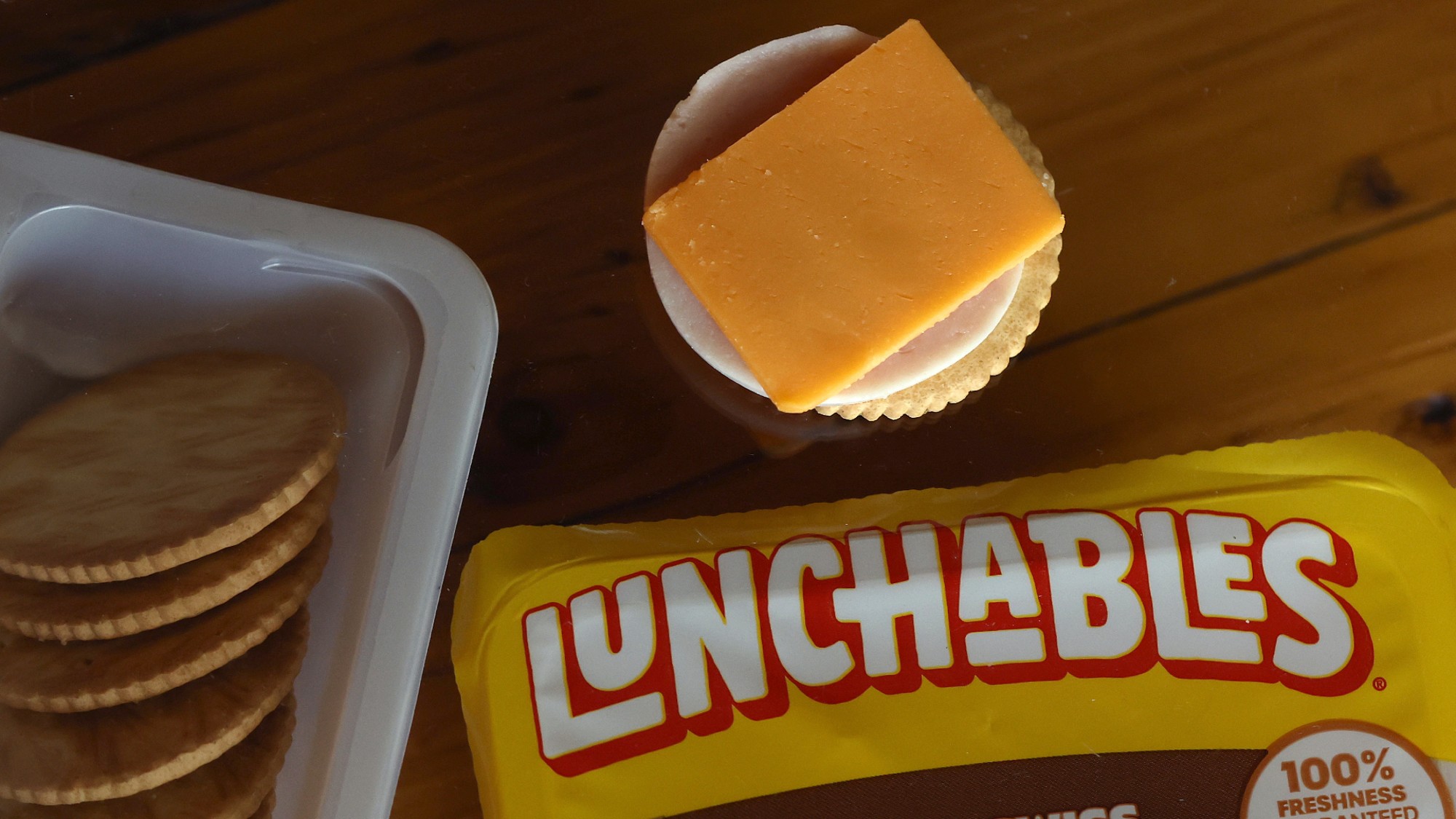Dangerous substances in Lunchables are raising concerns over children's health
High levels of lead and sodium were recently found in the snack packages


A free daily email with the biggest news stories of the day – and the best features from TheWeek.com
You are now subscribed
Your newsletter sign-up was successful
Lunchables were introduced in 1988 and have since become one of the most popular meals for children to bring to school. However, a consumer watchdog's recent report has startled parents across the country with an eye-raising claim: Lunchables kits are not as healthy for kids as previously thought.
The report, released April 9 by Consumer Reports, tested varieties of Lunchables, as well as other brands of meal kits for children. The report concluded that these kits "had potentially concerning heavy metal and phthalate levels," including high levels of lead, and "they're too high in sodium, especially for kids." Much of this has to do with the protein within Lunchables and other kits, since "regularly eating processed meat, a main ingredient in many of these products, has been linked to increased risk of some cancers," said Amy Keating, a registered dietitian at Consumer Reports.
Amid the concern over this study, Consumer Reports has petitioned the USDA to remove Lunchables from school lunch menus. What did the group specifically uncover about this iconic snack brand?
The Week
Escape your echo chamber. Get the facts behind the news, plus analysis from multiple perspectives.

Sign up for The Week's Free Newsletters
From our morning news briefing to a weekly Good News Newsletter, get the best of The Week delivered directly to your inbox.
From our morning news briefing to a weekly Good News Newsletter, get the best of The Week delivered directly to your inbox.
What did the study find?
Consumer Reports tested 12 store-bought lunch kits, including products from Lunchables, Armour, Oscar Mayer and Target's store brand Good & Gather. It was found that all of these products contained high levels of lead, but the three Lunchables kits tested had by far the most. The Lunchables Turkey and Cheddar Cracker Stackers kit contained 74% of the maximum allowable dose level of lead, the Pizza with Pepperoni kit contained 73% and the Extra Cheesy Pizza kit contained 69%. In regard to sodium, these Lunchables kits also contained, respectively, 49%, 45% and 34% of the recommended U.S. dietary guidelines. Two versions of Lunchables manufactured specifically for school lunch menus had even more sodium.
While Armour's Cracker Crunchers Ham & American kit had 67% of the maximum allowable dose of lead, every other kit tested had at least 10% less lead than all of the Lunchables kits. Some lead and other metals are "naturally found in the environment, which can partly account for their presence in food," Consumer Reports said. However, the processing that these kits go through "can also introduce heavy metals and chemicals found in plastic."
Even in small amounts, metals like lead can "cause developmental problems in children, as well as hypertension, kidney damage, and other health problems in adults," Consumer Reports said, and "no safe blood lead level in children has been identified," said the U.S. Centers for Disease Control and Prevention. Combined with the high levels of sodium in these kits and experts have been raising alarm bells over their consumption by children.
Lunchables do not provide the "nutrient-dense options we want young learners to be fed," nutritionist Maya Feller said to ABC News. Beyond the dangers from metals, the high sodium levels in the kits are "definitely of concern, especially from a young age. The health risks associated with high and chronic consumption of added salts are well-documented."
A free daily email with the biggest news stories of the day – and the best features from TheWeek.com
How could this affect school lunches?
Consumer Reports is urging the USDA to ban Lunchables and similar meal kits from school lunch menus, with its website allowing users to sign a petition to "do better for our kids' health!" A Washington Post investigation in 2023 highlighted how companies are able to lobby for processed foods on school menus, but Lunchables "are not a healthy option for kids and shouldn't be allowed on the menu as part of the National School Lunch Program," Brian Ronholm, the director of food policy at Consumer Reports, said in a press release.
The kits "are a good source of protein, offering nutrients through meats and cheeses," Kraft Heinz, the company that manufactures Lunchables, said in a statement to USA Today. All of its food products "meet strict safety standards that we happily feed to our own families," the company said. In addition, the two Lunchables kits that Kraft Heinz manufactures specifically for school lunch menus use a "specialized recipe that incorporates more protein and whole grains to keep kids powered throughout the day."
In regard to the petition, the USDA "doesn't allow or disallow individual food items, but rather sets requirements for the overall nutritional content of meals on a daily or weekly basis," the department said to NPR. As a result, the Lunchables described by Consumer Reports "would need to be paired with fruit, vegetables and milk."
Justin Klawans has worked as a staff writer at The Week since 2022. He began his career covering local news before joining Newsweek as a breaking news reporter, where he wrote about politics, national and global affairs, business, crime, sports, film, television and other news. Justin has also freelanced for outlets including Collider and United Press International.
-
 ‘Poor time management isn’t just an inconvenience’
‘Poor time management isn’t just an inconvenience’Instant Opinion Opinion, comment and editorials of the day
-
 Bad Bunny’s Super Bowl: A win for unity
Bad Bunny’s Super Bowl: A win for unityFeature The global superstar's halftime show was a celebration for everyone to enjoy
-
 Book reviews: ‘Bonfire of the Murdochs’ and ‘The Typewriter and the Guillotine’
Book reviews: ‘Bonfire of the Murdochs’ and ‘The Typewriter and the Guillotine’Feature New insights into the Murdoch family’s turmoil and a renowned journalist’s time in pre-World War II Paris
-
 ‘Longevity fixation syndrome’: the allure of eternal youth
‘Longevity fixation syndrome’: the allure of eternal youthIn The Spotlight Obsession with beating biological clock identified as damaging new addiction
-
 Europe’s apples are peppered with toxic pesticides
Europe’s apples are peppered with toxic pesticidesUnder the Radar Campaign groups say existing EU regulations don’t account for risk of ‘cocktail effect’
-
 Mixed nuts: RFK Jr.’s new nutrition guidelines receive uneven reviews
Mixed nuts: RFK Jr.’s new nutrition guidelines receive uneven reviewsTalking Points The guidelines emphasize red meat and full-fat dairy
-
 Stopping GLP-1s raises complicated questions for pregnancy
Stopping GLP-1s raises complicated questions for pregnancyThe Explainer Stopping the medication could be risky during pregnancy, but there is more to the story to be uncovered
-
 Choline: the ‘under-appreciated’ nutrient
Choline: the ‘under-appreciated’ nutrientThe Explainer Studies link choline levels to accelerated ageing, anxiety, memory function and more
-
 Ultra-processed America
Ultra-processed AmericaFeature Highly processed foods make up most of our diet. Is that so bad?
-
 Tips for surviving loneliness during the holiday season — with or without people
Tips for surviving loneliness during the holiday season — with or without peoplethe week recommends Solitude is different from loneliness
-
 More women are using more testosterone despite limited research
More women are using more testosterone despite limited researchThe explainer There is no FDA-approved testosterone product for women
